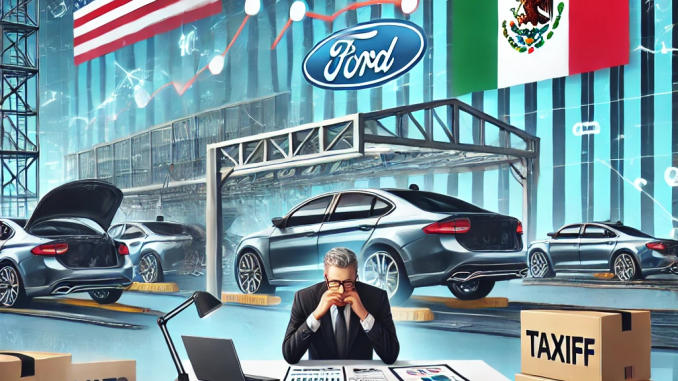
Introduction
The U.S. automotive industry is on high alert as new tariff policies threaten to disrupt supply chains, increase production costs, and impact vehicle prices. Jim Farley, CEO of Ford Motor Company, has issued a stark warning, stating that these tariffs could “blow a hole” in the industry, leading to significant economic consequences.
With the auto sector deeply reliant on a global supply chain, new trade barriers could affect everything from raw material imports to vehicle pricing and manufacturing jobs. In this article, we examine Farley’s concerns, the potential industry-wide impact, and what the future may hold for automakers and consumers alike.
The Tariff Problem: What’s Happening?
New U.S. Tariff Policies
The U.S. government is reportedly preparing to increase tariffs on vehicle imports, particularly from Mexico and Canada, two of the largest suppliers of automotive parts and assembled vehicles to the American market.
Key Concerns About the Tariffs
Jim Farley’s warning is based on several major concerns regarding the new tariffs:
• Increased Vehicle Costs: Higher tariffs will raise the cost of imported parts, making cars and trucks more expensive for American consumers.
• Disrupted Supply Chains: The North American supply chain is highly integrated, and tariffs could cause delays, shortages, and inefficiencies in vehicle production.
• Impact on American Manufacturing Jobs: While tariffs are meant to protect domestic industries, they could backfire by forcing automakers to cut jobs or relocate production to avoid financial losses.
• Competitive Disadvantage: Foreign automakers that manufacture vehicles outside of North America may not face the same cost increases, making American-made cars less competitive in the global market.
Ford’s Perspective: The Industry at Risk
Jim Farley’s Warning
During a recent earnings call, Jim Farley did not hold back in expressing his concerns:
“These tariffs could blow a hole in the U.S. auto industry. We rely on a complex, well-integrated supply chain across North America. Increasing costs through tariffs will hurt automakers, suppliers, and—ultimately—American consumers.”
Farley emphasized that the automotive industry is already dealing with inflationary pressures, supply chain disruptions from the pandemic, and increasing electric vehicle (EV) production costs. Adding higher tariffs to the mix could create additional financial strain on both automakers and buyers.
Ford’s Global Supply Chain at Stake
Ford, like most major automakers, relies on parts and raw materials from multiple countries, including:
• Mexico: A major hub for auto parts production, including engines, transmissions, and electronic components.
• Canada: A key supplier of steel, aluminum, and assembled vehicles.
• China & Europe: Sources for semiconductors, batteries, and specialized vehicle components.
If the U.S. government raises tariffs on Mexican and Canadian imports, Ford and other automakers will have to pay significantly more for essential components.
Electric Vehicles (EVs) and Tariff Challenges
One of the biggest areas of concern is the electric vehicle (EV) sector. EV production already has high costs due to expensive batteries and advanced technology components. New tariffs on imported battery materials, lithium, and semiconductors could further slow EV adoption by making them less affordable.
Ford’s EV strategy, which includes models like the F-150 Lightning and Mustang Mach-E, could face higher production costs—making it harder to compete with Tesla and foreign EV manufacturers that may not be affected by the same tariffs.
How Will This Affect Consumers?
1. Higher Car Prices
Consumers can expect higher sticker prices on vehicles, both domestic and imported. Automakers will likely pass on increased costs to buyers, leading to:
• More expensive new cars and trucks
• Potential delays in model releases due to cost concerns
• Higher financing rates as manufacturers offset costs
2. Reduced Vehicle Choices
If tariffs make some models too costly to produce, automakers may cut vehicle options or reduce trims and features to keep prices in check.
3. Delays and Supply Shortages
As manufacturers adjust to new trade rules, delays in parts availability and assembly line disruptions could lead to longer wait times for new vehicles.
Industry-Wide Consequences
1. U.S. Auto Manufacturing at a Crossroads
While the government’s intent behind the tariffs is to protect American industry, experts warn that it could have the opposite effect by making domestic production less sustainable.
Manufacturers may shift production elsewhere or cut back on expansion plans, leading to fewer jobs and plant closures in the long run.
2. Foreign Automakers Gaining a Competitive Edge
If U.S. automakers face higher production costs, foreign competitors—like Toyota, Volkswagen, and Hyundai—that manufacture outside North America may have a pricing advantage, further challenging American brands.
3. Impact on Auto Suppliers and Dealerships
Not just automakers, but also auto parts suppliers and dealerships will feel the pressure. Higher costs could lead to:
• Reduced supplier contracts and layoffs
• Lower dealer inventories and fewer incentives for buyers
• Increased maintenance and repair costs for consumers
What’s Next for the Auto Industry?
Potential Industry Adjustments
To mitigate the impact of these tariffs, automakers like Ford, GM, and Stellantis might:
• Seek exemptions or trade policy adjustments through negotiations.
• Explore alternative supply chain solutions (e.g., increasing domestic production but at a higher cost).
• Pass more costs onto consumers through increased vehicle pricing.
Political and Economic Uncertainty
With elections and geopolitical tensions influencing economic policies, the auto industry’s future remains uncertain. Lobbyists and automakers will likely push for tariff modifications to ease the financial burden on manufacturers and consumers.
Jim Farley’s warning about the impact of tariffs on the U.S. auto industry is a serious concern for manufacturers, suppliers, and consumers alike. While the goal of the tariffs may be to protect domestic production, they could backfire by increasing costs, disrupting supply chains, and reducing market competitiveness.
As Ford and other automakers navigate this evolving landscape, the industry will need to adapt quickly to avoid severe financial consequences. Meanwhile, consumers should brace for potential price hikes and longer wait times for new vehicles as the situation unfolds.
The next few months will be critical in determining whether these tariffs reshape the auto industry for better or worse.